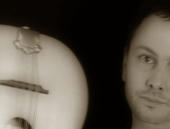Click Here to view the songwriter feature on Andy Rinehart in the December '06 issue of Guitar Player.
www.colorgray.net/p>
After the clouds cleared and the CMP label that made Rinehart's music available to the world was bought out by the film label Silva Screen, Rinehart quit music to become a pastry chef. For a few years suspended in a simple life, without the angst of having to court the muse, it was fun, it was revolutionary, but it couldn't last. On the phone to Seattle from Arcadia National Park 1998, yet another record deal knocking not quite hard enough at the proverbial door. Does the industry believe its own paradigm? And how does the songwriter ever recover from superman complex, that insidious vision that we bohemians will one day change the world? Life sets in, and perhaps even the famous find they missed the mark. Hey, what good is failure or success if neither inspire you to turn around and question EVERYTHING?
The paradigm is this: music=marketing. Is there such a thing as music if there is no listener? One could argue, not in American Idol America. But in Rinehart's quixotic world the presence of the listener may in some strange way obliterate music. Not to the extent that might be imagined, but the point of this rant is to describe the journey, not the protest. From 1999 forward Rinehart did several things in succession: built a studio, laid the foundation for an album length set of music, spent countless hours in sound design development, invited musicians to come play (some not even hearing a facsimile of the song that would eventually contain their performance), mixed the thing, then sold all the gear (even most of the instruments that were used) and removed any trace that the studio had ever been there. To add to the finality of the experiment Rinehart moved to a small coastal town in California for several months in order to dilute the trail.
What resulted was a strange-attractor of an album, a pathway that chaos might follow if it forgets to be random. Unlike the previous CMP release that was attended during production by the gifted aliens David Torn (producer, guitar), Mick Karn (bass), and Kurt Wortman (drums) Pillbox (the new album) is a notch closer to the bare, inner psyche of Rinehart, the good, the bad, the tender and the disturbing. "This is a record where real mandolas, accordions, oboes and strings commune with subterranean grooves, aggressive guitar noise-scapes (a la Matte Henderson) and above average chord-count, all disguised by songwriting that could almost be mistaken for pop." So says the idiom. But Rinehart hears mostly the quiet of a trail well disguised, speaks through the interest in the very building blocks of sound itself and, incidentally, through the selection of Keith Lobue as this latest album's resident and most otherworldly artist (as seen above). Pillbox therefore has to be seen AND heard to be... (believed?).
